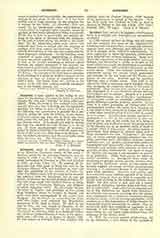

Accessus, a term applied to the voting in conclave for the election of a pope, by which a cardinal changes his vote and “accedes” to some other candidate. When the votes of the cardinals have been counted after the first balloting and the two-thirds majority has fallen to none of those voted for, at the following vote opportunity is granted for a cardinal to change his vote, by writing, Accedo domino Cardinali, mentioning some one of those who have been voted for, but not the cardinal for whom he has already voted. If he should not wish to change his vote, the cardinal can vote Nemini, i.e. for no one. If these supplementary votes of accession, added to those a candidate has received, equal twothirds of the total vote, then there is an election. If not, the ballots are burned, and the usual ballot takes place the next day. (See Conclave.)
JOHN J. A’ BECKET.


